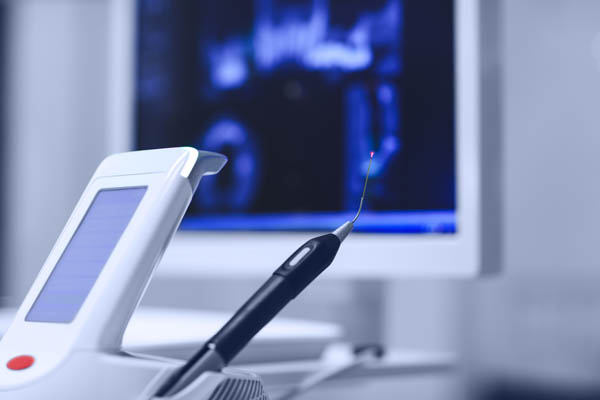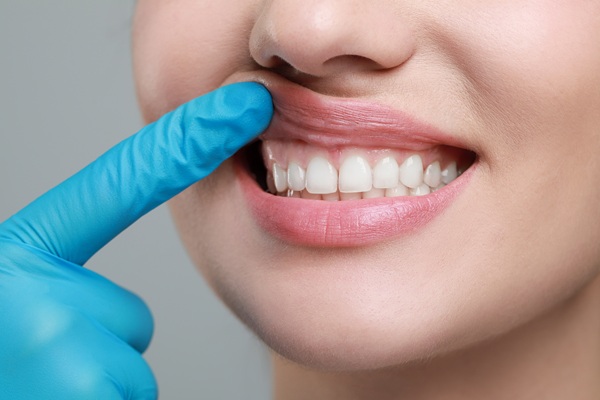When Is LAPIP™ Used to Treat Dental Implants?

The Laser-Assisted Peri-Implant Procedure, or LAPIP™, is the only FDA-approved laser treatment for dental implant issues. You would probably expect your dental implants to last a lifetime, and this expectation is in order. However, there are potential risks to dental implants' longevity. Peri-implantitis, or infection around an implant, may occur when patients do not maintain excellent oral health care. Fortunately, peri-implantitis can be treated, especially if the infection is caught early. Continue reading to learn about peri-implantitis, and how LAPIP is used to treat dental implants.
How is LAPIP™ used for treating implants?
Peri-implantitis is a kind of infection that is similar to periodontitis or advanced gum disease. The gums and supporting tissues in the oral cavity become infected and inflamed, causing the gums to bleed when brushing. Pockets of bacteria grow below the gum line as the condition advance, creating pockets that house germs and debris, aggravating the infection. Peri-implantitis can cause bone loss, which might jeopardize the stability of your implant.
Peri-implantitis is a degenerative disorder that cannot be managed at home, so patients should get treatment once they experience signs of the condition. If the condition is not present, the same daily oral hygiene routine that helps prevent gum disease can also help guard against peri-implantitis. Brush and floss every day, and visit the dentist regularly. Also, some lifestyle decisions, like smoking, might raise the risk of gum infections.
Peri-implantitis is distinct because it is a localized infection that can only develop around an implant rather than a natural tooth. It is also difficult to identify early. Most patients are unaware that they have an infection until they develop significant symptoms. An x-ray most commonly reveals peri-implantitis during a routine dental examination.
The LAPIP protocol and dental implant infection
There are numerous treatment options for dental implant infections. The most frequent methods are surgery or laser procedures, with laser therapy being the least invasive of the two.
At the implant base, a tiny laser is placed beneath the gums, where it targets and kills bacteria and diseased tissue. After that, ultrasonic instruments are used by the periodontist to remove any residual bacteria and ensure that the implant is completely clear of potentially harmful remnants. Finally, the laser is inserted beneath the gum line again to kill any bacteria that have survived. This process allows the gums to recover and reattach to the implant again.
LAPIP therapy has several advantages. To begin with, it is less intrusive than surgery and does not damage healthy gum tissue. The laser was created particularly to target diseased tissue. This therapy is highly efficient and fast. Finally, the laser stimulates gum and bone growth so that the density and mass of the natural bone can increase without the need for a bone graft, ensuring the implant's long-term stability.
The bottom line
Please call contact a periodontist if you have implants and suspect you have peri-implantitis. The LAPIP™ protocol ensures quick healing and recovery with minimal downtime.
Request an appointment here: https://corderoperiodontics.com or call Rafael E. Cordero, DDS PA at (561) 763-9221 for an appointment in our Palm Beach Gardens office.
Check out what others are saying about our services on Yelp: Read our Yelp reviews.
Recent Posts
A gum grafting procedure from an oral surgeon is a great way to improve the appearance of your smile, address any issues you may have with periodontal disease, and help ensure optimal support for your teeth. This review discusses the various benefits of a gum grafting procedure.As mentioned, there are cosmetic and oral health benefits…
A robust oral hygiene routine serves as the foundation for a healthy smile and gum disease prevention. When plaque and tartar accumulate along the gumline, the risk of periodontal issues increases significantly. Simple daily habits, combined with professional guidance, can significantly reduce the likelihood of gum inflammation and more serious periodontal complications. Here are simple,…
Preparing for dental implant recovery is just as important as getting ready for the dental implants themselves. A good recovery sets the stage for successful implants that can last the rest of your life, with few additional changes or fixes. Here is what to expect after a dental implant procedure so you can adjust your…
LANAP® is a non-invasive, less painful alternative to traditional gum surgery. In the United States, advanced gum disease, often known as periodontitis, is the most common cause of tooth loss, and it often requires gum surgery to treat once it is advanced. This intrusive operation is often uncomfortable and requires a lengthy recovery period. Continue…


